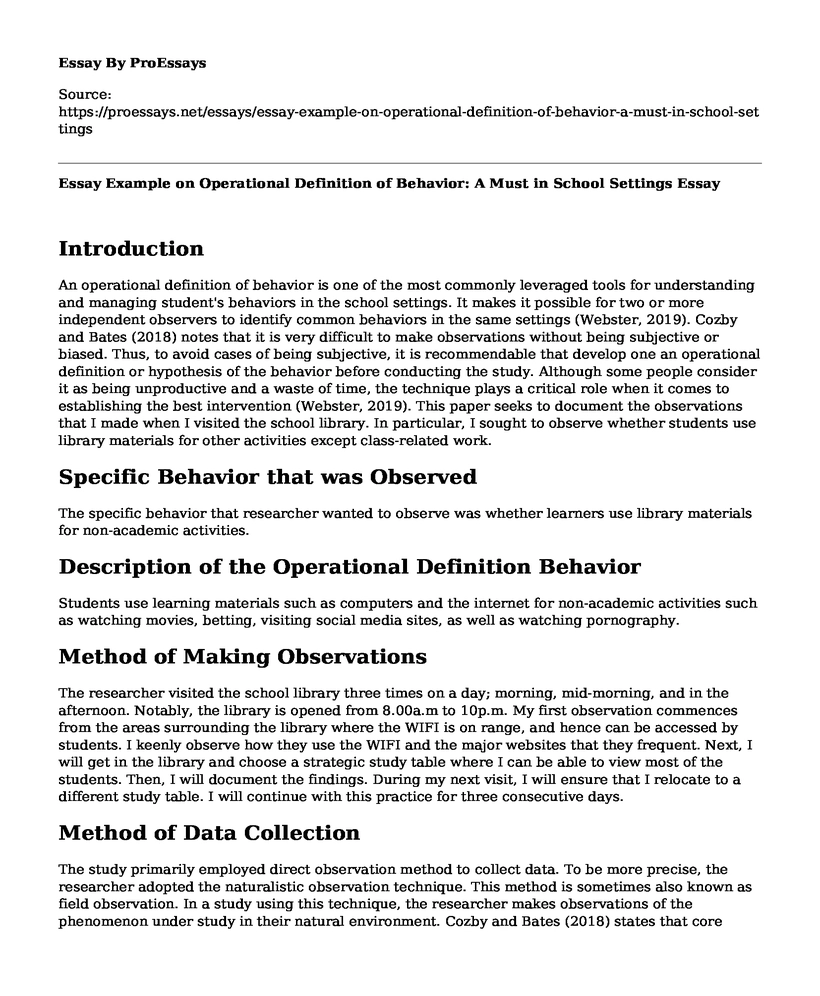Introduction
An operational definition of behavior is one of the most commonly leveraged tools for understanding and managing student's behaviors in the school settings. It makes it possible for two or more independent observers to identify common behaviors in the same settings (Webster, 2019). Cozby and Bates (2018) notes that it is very difficult to make observations without being subjective or biased. Thus, to avoid cases of being subjective, it is recommendable that develop one an operational definition or hypothesis of the behavior before conducting the study. Although some people consider it as being unproductive and a waste of time, the technique plays a critical role when it comes to establishing the best intervention (Webster, 2019). This paper seeks to document the observations that I made when I visited the school library. In particular, I sought to observe whether students use library materials for other activities except class-related work.
Specific Behavior that was Observed
The specific behavior that researcher wanted to observe was whether learners use library materials for non-academic activities.
Description of the Operational Definition Behavior
Students use learning materials such as computers and the internet for non-academic activities such as watching movies, betting, visiting social media sites, as well as watching pornography.
Method of Making Observations
The researcher visited the school library three times on a day; morning, mid-morning, and in the afternoon. Notably, the library is opened from 8.00a.m to 10p.m. My first observation commences from the areas surrounding the library where the WIFI is on range, and hence can be accessed by students. I keenly observe how they use the WIFI and the major websites that they frequent. Next, I will get in the library and choose a strategic study table where I can be able to view most of the students. Then, I will document the findings. During my next visit, I will ensure that I relocate to a different study table. I will continue with this practice for three consecutive days.
Method of Data Collection
The study primarily employed direct observation method to collect data. To be more precise, the researcher adopted the naturalistic observation technique. This method is sometimes also known as field observation. In a study using this technique, the researcher makes observations of the phenomenon under study in their natural environment. Cozby and Bates (2018) states that core objective of naturalistic observation is to an accurate picture of what happens in the settings. To achieve this, I recorded all observations that I considered important to the study.
Ethical Implications of the Adopted Data Collection Method
Markedly, as covert observation, the method is direct violation of the principle of getting informed consents from the participants (Panter & Sterba, 2011). However, if I inform them, it is highly likely that it will negatively influence the findings of the study. Thus, I consider naturalistic observation as the best method of collecting data. Nonetheless, the data collected will be treated with a lot of confidentiality and privacy.
Evaluation of the Operational Definition
The general observations that I made include:
- Students who accessed the library's WIFI from outside were mostly using it to visit social media websites, download songs, or play online games. Nonetheless, a few of them used it to access e-learning materials and the university's portal. Also, I noticed that most of them were in companies.
- On the other hand, most of the students who were in the library used the internet for educational activities. I could see a number of them read e-books as well as consult with the ICT manager in case they encountered any challenges. However, I could see a few of them use the internet to download materials that were explicit in nature. Some also played e-games and visited social media websites.
- Although most of the time the internet connectivity remained strong, there were two instances when there was a downtime. In case of the latter incidence, the number of students who remained in the library were few.
To wrap up, it is evident that internet plays a critical role in the pedagogy sector, especially now that we are living in a digital era. Most of the students are computer literate who are always at the fore-front of leveraging the internet. However, as evidenced from the observational study, some students use the internet for non-academic activities such as downloading explicit contents and playing e-games. In light of this, I recommend that the ICT department develop measures that will block such sites in order to ensure that the Library's internet is only used for academic purposes.
References
Cozby, P. C., & Bates, S. (2018). Methods in behavioural research. McGraw-Hill Ryerson Limited.
Panter, A. T., & Sterba, S. K. (Eds.). (2011). Handbook of ethics in quantitative methodology. Taylor & Francis.
Webster, J. (2019). Operational Definition of Behavior in a School Setting. Retrieved from https://www.thoughtco.com/operational-definition-of-behavior-3110867
Cite this page
Essay Example on Operational Definition of Behavior: A Must in School Settings. (2023, Jan 27). Retrieved from https://proessays.net/essays/essay-example-on-operational-definition-of-behavior-a-must-in-school-settings
If you are the original author of this essay and no longer wish to have it published on the ProEssays website, please click below to request its removal:
- Evaluation Paper on Fluor Corporation
- Scholarship and My Aspiration for Cosmetology Field Essay
- Paper Example on Violence Exposure & Its Impact on Child Development
- Teachers-Learners Relationships with Disabilities: A Qualitative Study
- Essay Example on Honors vs Regular Students: Engagement & Self-Handicapping.
- Essay Example on Effective Literacy Stations: Vital for Early Childhood Development
- Research Paper Example on Technology Revolutionizing American Education: Online Courses







